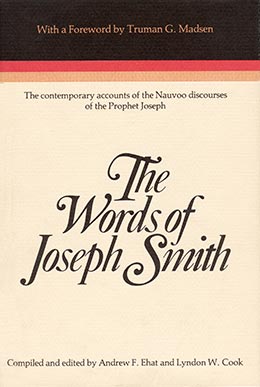17 May 1843 (2) (Wednesday Evening). Ramus, Illinois
[1] In the evening we went to hear a Methodist preacher lecture. [2] After he got through Pres. J. offered some corrections as follows. The 7th verse of C 2 of Genesis ought to read God breathed into Adam his spirit or breath of life, [3] but when the word "ruach" [4] applies to Eve it should be translated lives. Speaking of eternal duration of matter he I said. There is no such thing as immaterial matter. All spirit is matter but is more fine or pure and can only be discerned by purer eyes. We cant see it but when our bodies are purified we shall see that it is all matter.
Samuel A. Prior Statement, Times and Seasons 4 (15 May 1843): 198
In the evening I was invited to preach, and did so.—The congregation was large and respectable—they paid the utmost attention. This surprised me a little, as I did not expect to find any such thing as a religious toleration among them.—After I had closed, Elder Smith, who had attended, arose and begged leave to differ from me in some few points of doctrine, and this he did mildly, politely, and affectingly; like one who was more desirous to disseminate truth and expose error, than to love the malicious triumph of debate over me. I was truly edified with his remarks, and felt less prejudiced against the Mormons than ever. He invited me to call upon him, and I promised to do so.
—17 May 1843 (2)
Notes
[1] See History of the Church, 5:392-93 and Teachings, pp. 301-2. The original source for these entries is the William Clayton Diary.
[2] Samuel A. Prior.
[3] In his publication of the book of Abraham the year before, Joseph Smith included this translation of Genesis 2:7: "And the Gods formed man from the dust of the ground, and took his spirit [i.e., the man's spirit], and put it into him; and breathed into his nostrils the breath of life, and man became a living soul" (Abraham 5:7).
[4] As shown in the last note, Joseph Smith interpreted the phrase breath of life in Genesis 2:7 to mean Adam's [pre-mortal] spirit, which spirit (ruwach) was put into the body to form a living soul (D&C 88:15: "the spirit and the body are the soul of man."). However the word ruwach does not appear in this passage nor in Genesis 3:20, where the name Eve (Chavvah, meaning life-giving) appears. It is clear why Joseph Smith used the word ruwach in connection with Genesis 2:17, but his use of this word in connection with Genesis 3:20 is not so clear. Possibly he wanted to emphasize Eve's role as lives-giver, which coincides with the usage of lives soon to appear in the revelation on eternal marriage (D&C 132:22-24). Parenthetically we note that in some published versions of this discourse, the transliteration of the Hebrew word for "spirit" is given incorrectly as rauch. Obviously, Joseph Smith cannot be faulted for scribal errors; however, as seen here, Clayton (as far as phonetic spelling goes) correctly gives the transliteration as ruach.
